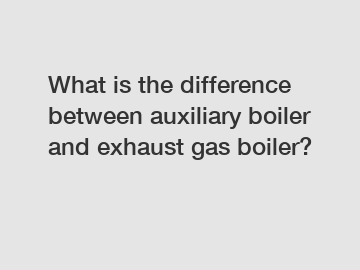What is the difference between auxiliary boiler and exhaust gas boiler?
What is the Difference Between Auxiliary Boiler and Exhaust Gas Boiler?
In the maritime industry, boilers play a crucial role in providing steam for various purposes, ranging from propulsion to heating and electricity generation. Two types of boilers commonly used on ships are auxiliary boilers and exhaust gas boilers. While both serve the purpose of generating steam, they differ in their function, construction, and operation. In this article, we will explore the differences between auxiliary boilers and exhaust gas boilers, shedding light on their individual characteristics and applications.
Auxiliary Boilers:

(H2) Function and Purpose.
Auxiliary boilers, also known as auxiliary steam generators, are designed to provide steam at lower pressures and capacity compared to the main boilers on a ship. They assist in various shipboard operations, such as supplying steam to the heating systems, fuel heating, tank cleaning, and cargo heating during the voyage. Auxiliary boilers are generally smaller and less complex than the main boilers, making them more suitable for these auxiliary functions.
(H2) Construction and Operation.
Auxiliary boilers are typically fire-tube boilers that use diesel oil or fuel oil as their primary fuel source. They consist of a combustion chamber, where the fuel is burned, and a series of tubes that allow the hot gases to pass through, transferring heat energy to the surrounding water. The resulting steam is then used for the intended auxiliary purposes. Auxiliary boilers require a separate burner, fuel supply system, and control panel for independent operation.
Exhaust Gas Boilers:
(H2) Function and Purpose.
Exhaust gas boilers, also known as waste heat recovery boilers, are specifically designed to recover heat from the exhaust gases of the ship's main engines. These boilers utilize the thermal energy present in the exhaust gases, which would otherwise be wasted, to generate steam. Exhaust gas boilers help enhance the overall energy efficiency of the ship's propulsion system by utilizing this otherwise wasted heat to produce auxiliary steam.
(H2) Construction and Operation.
Exhaust gas boilers are usually water tube boilers that utilize the heat from the ship's engine exhaust gases to produce steam. The exhaust gases pass through a series of tubes, transferring their heat to the water around them. This produces steam, which can then be used for various purposes on the ship. Unlike auxiliary boilers, exhaust gas boilers are integrated into the ship's overall steam system, requiring less separate equipment for operation.
Differences and Applications:
(H2) Heat Source.
The primary difference between auxiliary boilers and exhaust gas boilers lies in the heat source. Auxiliary boilers rely on the combustion of fuel oil, whereas exhaust gas boilers utilize the waste heat from the ship's main engines. This fundamental difference in heat source determines their respective applications. Auxiliary boilers are mainly used for non-propulsion purposes, while exhaust gas boilers are specifically designed to recover heat from the ship's propulsion system.
(H2) Integration.
Another key difference is the level of integration with the ship's steam system. Auxiliary boilers are generally independent and require separate systems for their operation, including fuel supply and control. On the other hand, exhaust gas boilers are integrated into the ship's overall system, making use of the existing steam system and requiring less separate equipment. This integration enhances their efficiency and reduces the overall complexity of the ship's boiler system.
Closing paragraph:
In conclusion, auxiliary boilers and exhaust gas boilers differ in their function, construction, and operation. Auxiliary boilers are designed to serve auxiliary purposes within a ship, utilizing fuel oil as their heat source, while exhaust gas boilers recover waste heat from the ship's main engines, acting as a heat recovery system. Understanding the differences between these two types of boilers is crucial for ship operators to make informed decisions regarding their installation and use. For more information about boilers or any maritime-related queries, please feel free to contact us.
If you want to learn more, please visit our website professional horizontal waste heat boiler, Best Heat Recovery Steam Boiler, Gas Engine Waste Heat Boiler.
229
0
0

Comments
All Comments (0)